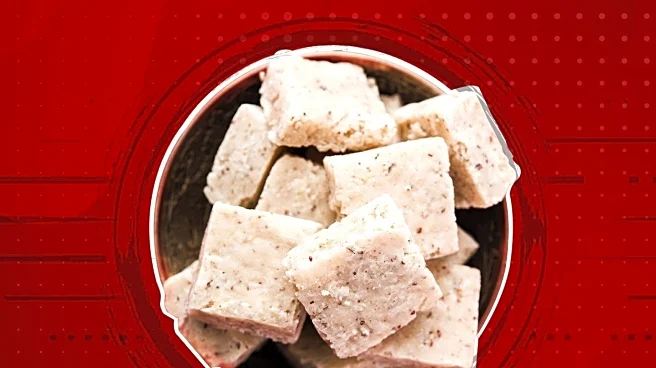What's Happening?
Energy pouches, small sachets containing active ingredients like caffeine, are becoming increasingly popular among athletes and fitness enthusiasts. These pouches are marketed as a convenient way to enhance energy, focus, and motivation without the need for traditional energy drinks or coffee. Brands such as Dryv, Mojo, and LF*GO! offer various formulations, some containing caffeine and others featuring nootropic compounds. The pouches are designed to be fast-acting and portable, making them suitable for use during workouts or busy days. A registered dietitian conducted tests on several popular energy pouch brands, evaluating their effectiveness and ingredient transparency. The tests revealed that while some pouches provide a steady energy boost without causing jitters or crashes, others lack third-party certification, raising questions about ingredient accuracy.
Why It's Important?
The rise of energy pouches reflects a growing trend in the functional beverage market, where consumers seek convenient and effective ways to enhance their physical and cognitive performance. This trend is driven by increasing health consciousness and the demand for products that fit into active lifestyles. Energy pouches offer a portable alternative to traditional energy drinks, appealing to those who prefer a hands-free option. However, the lack of third-party testing and transparency in ingredient labeling poses potential risks, as consumers may unknowingly ingest substances that could affect their health or performance. The popularity of these products highlights the need for regulatory oversight to ensure safety and efficacy, impacting both consumers and manufacturers in the functional beverage industry.
What's Next?
As energy pouches continue to gain traction, manufacturers may face increased scrutiny regarding ingredient transparency and safety standards. Regulatory bodies could implement stricter guidelines to ensure that products are accurately labeled and free from harmful substances. This could lead to a shift in the market, with companies prioritizing third-party testing and certification to build consumer trust. Additionally, ongoing research into the effects of nootropic compounds and other ingredients may influence product formulations, offering new opportunities for innovation. Consumers are likely to become more discerning, seeking products that align with their health goals and lifestyle preferences.
Beyond the Headlines
The growing popularity of energy pouches may also influence cultural perceptions of energy consumption and performance enhancement. As these products become more mainstream, they could challenge traditional views on caffeine and stimulant use, promoting a more nuanced understanding of their benefits and risks. This shift may encourage broader discussions about the role of supplements in daily life and the importance of informed consumer choices. Furthermore, the trend could spur advancements in packaging technology, as companies strive to create more sustainable and user-friendly designs.










